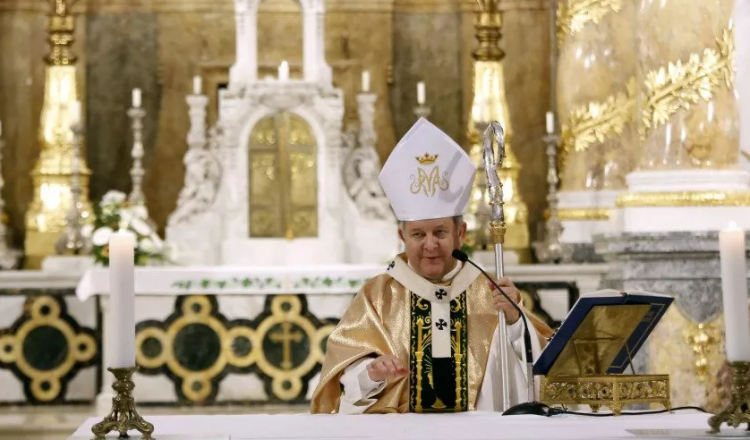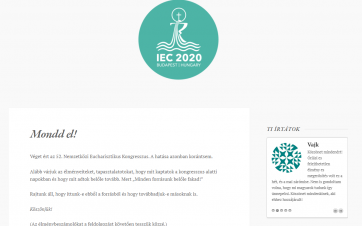
For the kingdom of God

Balázs Bábel, Metropolitan Archbishop of the Kalocsa-Kecskemét Archdiocese celebrated his 45th ordination anniversary this year. He serves in one of the oldest Archdioceses of Hungary, founded by King St. Stephen. For long years the Archbishop played an important role in educating the new priestly generation, amongst others in the Central Seminary in Budapest. We can also meet him at the IEC.
From Gyón to Kalocsa
Balázs Bábel, Metropolitan Archbishop of the Kalocsa-Kecskemét Archdiocese was born in the village of Gyón (currently part of the Dabas region). He studied at the College and Seminary of Theology named after Saint Charles Borromeo in the city of Vác, Hungary. A few years later he was appointed Rector of his former Seminary. He performed his pastoral ministry in many parishes around the Pest county, amongst others in the villages of Valkó, Tápiószecső and Tóalmás. Father Babel was also professor at the Faculty of Theology of the Pázmány Péter Catholic University, Hungary. He was ordained bishop in 1999, and appointed Metropolitan Archbishop of the Kalocsa-Kecskemét Archdiocese the very same year. Father Bábel took as motto: For the Kingdom of God. Present short biographical account is far from being able to demonstrate the Archbishop’s rich life path that has characterised his 45 years of service so far.

Fascinated by archaeology
Balázs Bábel was born into a landowner, farmer family. However, the post-war agricultural collectivization has demolished this lifestyle. He grew up in a religious family, but his interest first turned him towards an archaeological career. In addition to his fondness of learning, his Piarist father teachers made him love the Church and the community life, thus even before the end of his high school studies he was obviously determined on becoming a priest.
Alone in the meadow
In his essay written in the Vigilia Catholic newspaper he recalled a small story of his life. In the year, right before his high school graduation he had to go out the fields totally alone to harvest hay. In his loneliness he was thinking on the meaning of life and on the purpose of being on earth. As a teenager, in the midst of faith struggles and crises, such questions and looking for answers fundamentally set him apart from his contemporaries. It was his last secondary school year when the answers, even more, the confirmation that of arrived. His professor, László Lukács, played a major role in finding answers to his questions. Contrary to the textbook schemes, Professor Lukács was teaching the Bible and introducing faith to the youth in the spirit of the Second Vatican Council. “I was strengthened in my faith, moreover, my previous decision on the priestly vocation became absolutely clear.” – wrote the Archbishop in his memoires.
Seminary student in the garrison
He started his seminary studies in the fall of 1969, even so a month or two later he was called up for his obligatory military service. Unlike other university faculties, the theological one did not grant exemption from enlistment. Furthermore, it was quite a delicate time politically. A year after the 1968 Prague Spring the communist leadership feared the recurrence of the 1956 events. This atheist and communist period was a real challenge for a seminary student. “I was driven by the thought that there was a reason for me to be there, because I had to make my testimony here, in front of people who were far from the Church, from Jesus and God, and sometimes even behaving hostile. By now I have realized that it has been far more beneficial for me than perhaps for them, since I have never been locked up in my life with people, of whom many did not even complete their eight classes of school, not to mention the ones having been already in prison at a young age. On top, I was the only seminarian, and no solidarity was provided from the others.”

Strictly controlled sentences
Upon his return to the Seminary, given the experiences he had, a priestly motto, encapsulating the belief, had to be chosen. Goes without saying this was also strictly controlled by the state authorities. One of the sentences of the Sermon on the Mount embraced him the most. “Seek first his Kingdom and His righteousness.” (Matthew 6:33). Jesus’ call has become Balázs Bábel’s spiritual compass that he transformed into his episcopal motto: “Pro Regno Dei – For the Kingdom of God.”
Under surveillance
The young priest thought that his entire life and pastoral service would pass along the communist era, and he would be a second ranked citizen, as he had experienced it during his military service. “You are the enemy of the people” – he was said by the investigating officer at his police interrogation. Having failed to deliver books to Transylvania the police took him under investigation. Following this event his passport application was regularly refused. However, he had a lot to do within the country borders as well: he paid visits to families, built up the parish community both spiritually and physically. Nothing could discourage him from his vocation. Not even the facts that sometimes even clerical persons reported on his Biblical classes, homilies and statements he did within the community. “In the Regnum Marianum community, which I became a member of, I met people who had endured persecutions a hundred times larger, and that gave me a huge strength.”- recalled the Archbishop.
Towards unity
Few things have been realized from the great hopes at the time of the regime change. The national euphoria has gone, yet the duties of Balázs Bábel remained the same: to educate good priests for the community. He did his best to hand over the essence, the key points of his pastoral ministry. The main pillar of his creed was that priestly vocation cannot be performed with half heart. Pastoral ministry and people should be loved with all heart – he said in an interview given to the newspaper Magyar Kurír last year. As a child Balázs Bábel had to face religious division, a great heartache for him. His paternal great-grandfather was Protestant, while his maternal grandfather Lutheran. As the President of the Ecumenical Committee of the Hungarian Catholic Bishops’ Conference Father Bábel strongly believes that “One should stand up for the Catholic truth of faith, but should remember that there are true Christ believers on both sides. And this is the point that shows the way towards unity.”
Source: Vigilia, Magyar Kurír, katolikus.hu










